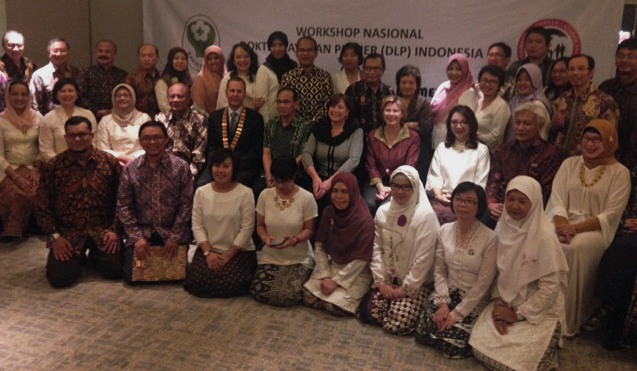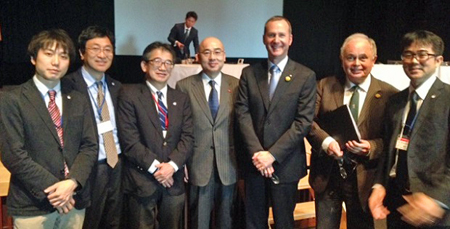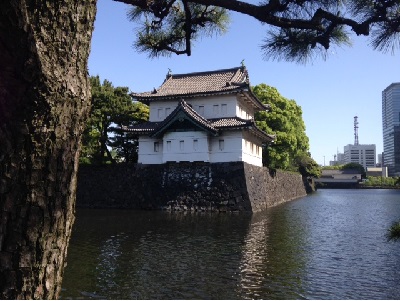From the President
Family Medicine challenges in Japan & Indonesia
 Photo: New fellows of the Indonesian College of Primary Care Physicians
español français
Photo: New fellows of the Indonesian College of Primary Care Physicians
español français
This past month I have visited family medicine colleagues in Japan and Indonesia and have gained insights into some of the challenges facing family medicine development in each country.
I visited Japan as a guest of WONCA member organisation, the Japan Primary Care Association, to speak at a special meeting in honour of the life’s work of family medicine pioneer, Professor Izumi Maruyama. Much of the focus of the meeting was on the challenge of providing primary health care services to an ageing population.
 Photo: WONCA president with Professor Ryuki Kassai, Dr Roger Neighbour and colleagues from the Japan Primary Care Association
Photo: WONCA president with Professor Ryuki Kassai, Dr Roger Neighbour and colleagues from the Japan Primary Care Association
Japan will be one of the first country’s that will face the impact of a substantial proportion of the population being elderly. In 2025 the population of Japan aged 65 years and over, will exceed one third of the total population. How Japan addresses the challenges of an ageing population will provide examples to assist service provision development in many other countries.
One of the indicators of the impact of the ageing of the population of Japan is the dramatic increase in the past ten years of elderly people who have been found dead at home. It is one sobering consequence of a significant change in Japanese society with more elderly people living on their own, rather than with their family members.
 Photo: Blend of old and new in downtown Tokyo
Photo: Blend of old and new in downtown Tokyo
Japan is also seeing the continuing expansion of mega cities, while small rural towns decline in population. At the same time, the population of elderly people living in small towns is increasing. This results in the small rural towns struggling to provide needed resources to support their elderly citizens. It also provides challenges for the family doctors and the members of their primary care teams based in both small rural towns and mega cities.
In May, the World Health Assembly met in Geneva. This is the annual gathering of the world’s health ministers that sets the global agenda for the year ahead for the World Health Organization. The World Health Assembly this year endorsed a new global strategy and action plan on ageing and health to assist the nations of the world prepare for the challenge of ensuring health care for increasing numbers of elderly people.
We all know that populations around the world are ageing rapidly. Between the year 2000 and 2050, the proportion of the world’s population aged 60 years or over is predicted to double from about 11% to 22%, or 2.1 billion people.
Of course, whether 60 is old or not depends on your own age. It looks quite young from where I am on my personal timeline.
The WHO reminds us that these “extra years of life and this reshaping of society will have profound implications for each of us, and for the communities we live in. Yet, unlike many of the surprising changes that society will experience in the next 50 years, these trends are largely predictable. Since we know that the demographic transition to older populations will occur, we can plan to ensure we are prepared.”
We also know that the solution to providing equitable, quality health care to the older members of our population, and addressing the challenges of increasing numbers of people with multiple chronic health conditions and mental health concerns, is not going to be addressed by building more and more shiny new hospitals and residential aged care facilities. We need to strengthen community-based health care and support services, aiming to allow people to remain in their own homes, and expand lifelong prevention and health promotion programs to assist people to remain as well as possible for as long as possible.
Indonesia is another country seeing a rise in non-communicable diseases and mental health concerns. Indonesia has a population of 250,000,000 people living on an archipelago of 17,000 inhabitable islands, many isolated and with sparse health care services.
In Indonesia I attended the inaugural meeting of the new Indonesian College of Primary Care Physicians. In 2013 the Government of Indonesia enacted a new law recognising the specialty of family medicine. Family doctors, with formal postgraduate qualifications are called primary care physicians in Indonesia. The Indonesian Government has also introduced Universal Health Insurance to ensure universal health care, ensuring that all citizens have access to affordable health care services.
The Government of Indonesia has recognised the importance of family medicine in achieving universal health coverage and has funded the development of postgraduate specialty training in family medicine based in 17 of the country’s leading university medical schools. The training program will be for three years for recent medical graduates, with a fast-track for experienced primary care doctors. Formal assessment at the end of training will lead to Fellowship of the Indonesian College of Primary Care Physicians.
In Jakarta I joined a ceremony to recognise the “grandfathering” of the family medicine leaders of the 17 medical schools. This distinguished group of grandmothers and grandfathers became the foundation fellows of the Indonesian College of Primary Care Physicians
Heart attacks, strokes and other cardiovascular disease together represent a huge global health burden world-wide, accounting for over 17 million deaths every year. This month, WONCA, along with other leading global health organisations, has signed the Mexico Declaration for Cardiovascular Health, committing our organisations to work together to avoid millions of premature deaths by orchestrating a coordinated response to the global pandemic of cardiovascular disease. As cardiovascular disease makes up half of all deaths from non-communicable diseases, our efforts through working together are central to achieving the United Nation’s Sustainable Development Goals.
The Mexico Declaration on improving cardiovascular health for all people can be found
here.
Michael Kidd
President, World Organization of Family Doctors (WONCA)